Management Communication: Corporate Social Responsibility Report
VerifiedAdded on 2023/06/04
|10
|2295
|310
Report
AI Summary
This report delves into the crucial role of effective communication in corporate social responsibility (CSR), addressing the question of why managers should prioritize it. It examines various aspects, including personal and interpersonal communication, focusing on persuasion and influence, as well as formal and informal communication channels within an organization. The report also explores how communication relates to sustainability, specifically the communication of CSR activities and achievements. The case study analyzes the ABC Company's initiatives to reduce environmental impact, promote social sustainability, and ensure financial sustainability. It highlights the motives, benefits of CSR, and offers recommendations for organizations to improve their communication strategies. The report emphasizes the importance of effective communication for employee engagement, stakeholder relations, and overall business success, ultimately concluding that effective communication is vital for achieving optimal benefits from CSR efforts.
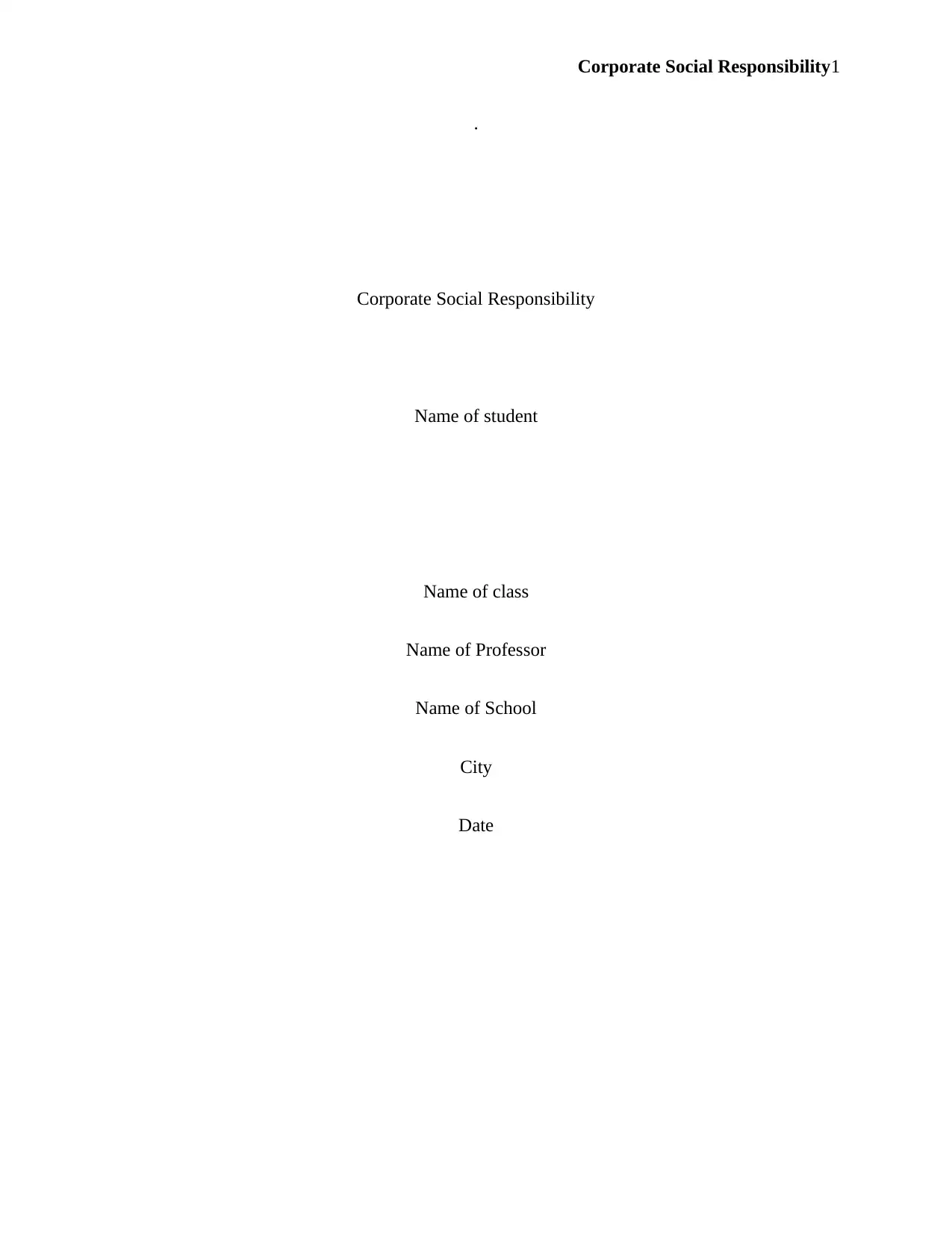
Corporate Social Responsibility1
.
Corporate Social Responsibility
Name of student
Name of class
Name of Professor
Name of School
City
Date
.
Corporate Social Responsibility
Name of student
Name of class
Name of Professor
Name of School
City
Date
Paraphrase This Document
Need a fresh take? Get an instant paraphrase of this document with our AI Paraphraser
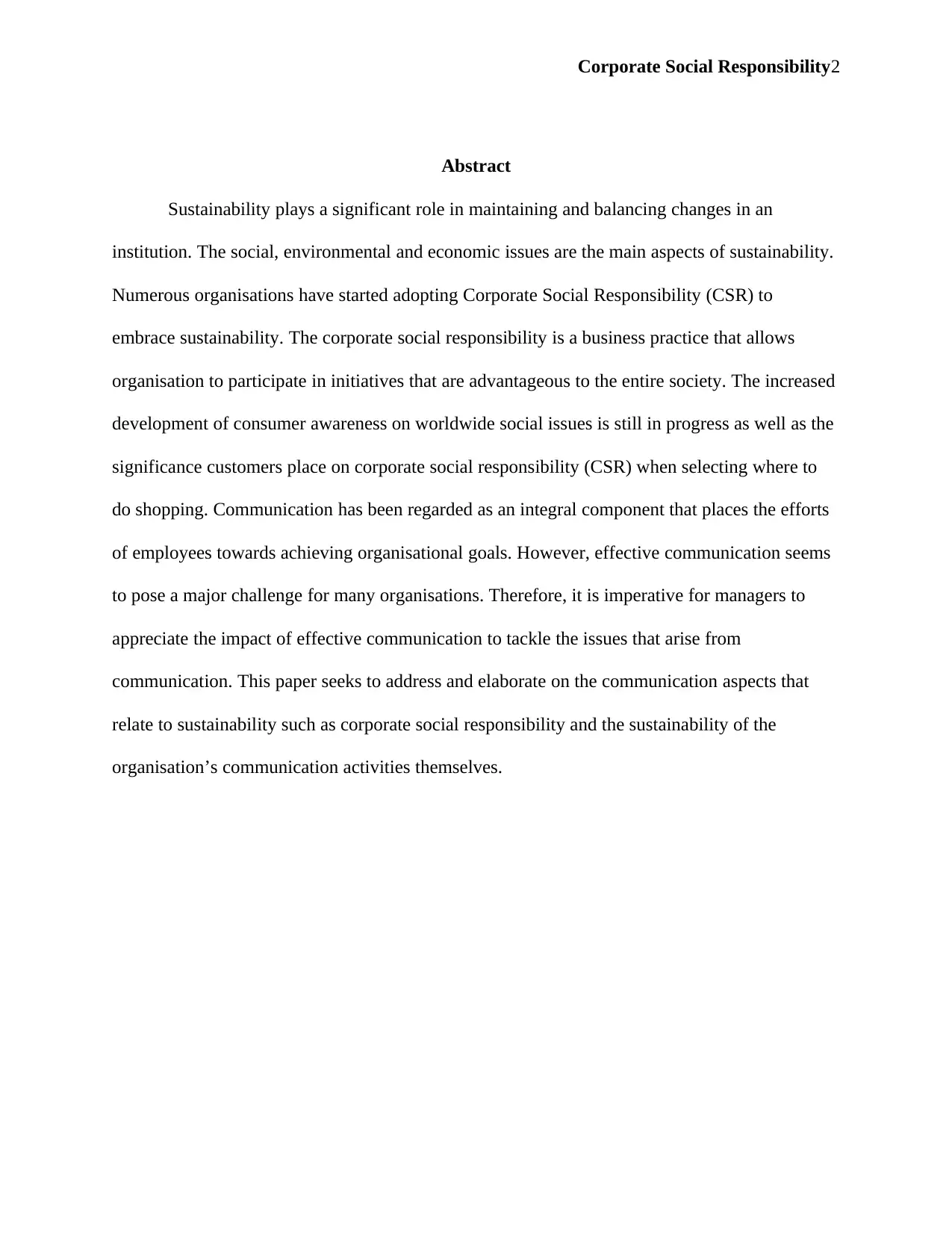
Corporate Social Responsibility2
Abstract
Sustainability plays a significant role in maintaining and balancing changes in an
institution. The social, environmental and economic issues are the main aspects of sustainability.
Numerous organisations have started adopting Corporate Social Responsibility (CSR) to
embrace sustainability. The corporate social responsibility is a business practice that allows
organisation to participate in initiatives that are advantageous to the entire society. The increased
development of consumer awareness on worldwide social issues is still in progress as well as the
significance customers place on corporate social responsibility (CSR) when selecting where to
do shopping. Communication has been regarded as an integral component that places the efforts
of employees towards achieving organisational goals. However, effective communication seems
to pose a major challenge for many organisations. Therefore, it is imperative for managers to
appreciate the impact of effective communication to tackle the issues that arise from
communication. This paper seeks to address and elaborate on the communication aspects that
relate to sustainability such as corporate social responsibility and the sustainability of the
organisation’s communication activities themselves.
Abstract
Sustainability plays a significant role in maintaining and balancing changes in an
institution. The social, environmental and economic issues are the main aspects of sustainability.
Numerous organisations have started adopting Corporate Social Responsibility (CSR) to
embrace sustainability. The corporate social responsibility is a business practice that allows
organisation to participate in initiatives that are advantageous to the entire society. The increased
development of consumer awareness on worldwide social issues is still in progress as well as the
significance customers place on corporate social responsibility (CSR) when selecting where to
do shopping. Communication has been regarded as an integral component that places the efforts
of employees towards achieving organisational goals. However, effective communication seems
to pose a major challenge for many organisations. Therefore, it is imperative for managers to
appreciate the impact of effective communication to tackle the issues that arise from
communication. This paper seeks to address and elaborate on the communication aspects that
relate to sustainability such as corporate social responsibility and the sustainability of the
organisation’s communication activities themselves.
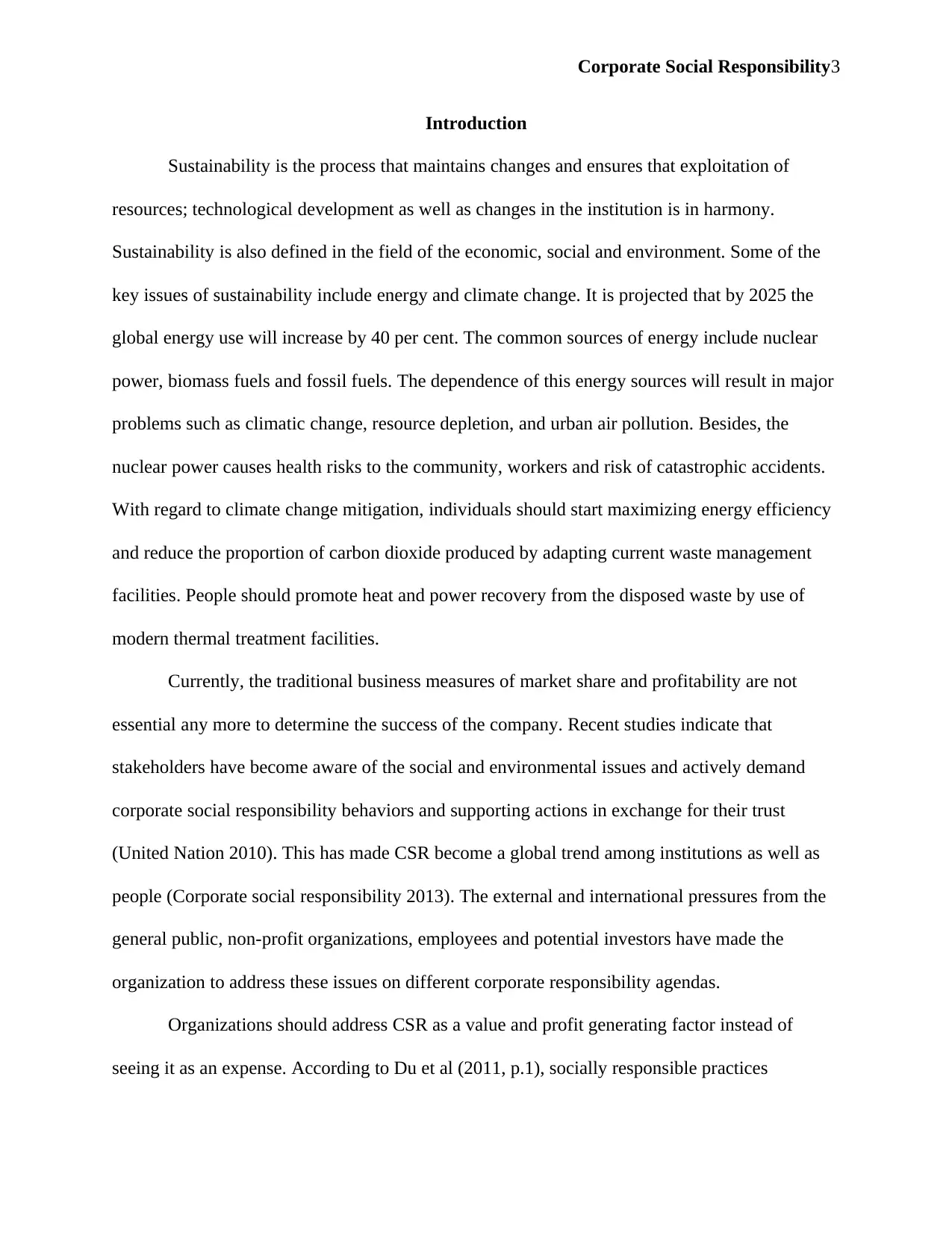
Corporate Social Responsibility3
Introduction
Sustainability is the process that maintains changes and ensures that exploitation of
resources; technological development as well as changes in the institution is in harmony.
Sustainability is also defined in the field of the economic, social and environment. Some of the
key issues of sustainability include energy and climate change. It is projected that by 2025 the
global energy use will increase by 40 per cent. The common sources of energy include nuclear
power, biomass fuels and fossil fuels. The dependence of this energy sources will result in major
problems such as climatic change, resource depletion, and urban air pollution. Besides, the
nuclear power causes health risks to the community, workers and risk of catastrophic accidents.
With regard to climate change mitigation, individuals should start maximizing energy efficiency
and reduce the proportion of carbon dioxide produced by adapting current waste management
facilities. People should promote heat and power recovery from the disposed waste by use of
modern thermal treatment facilities.
Currently, the traditional business measures of market share and profitability are not
essential any more to determine the success of the company. Recent studies indicate that
stakeholders have become aware of the social and environmental issues and actively demand
corporate social responsibility behaviors and supporting actions in exchange for their trust
(United Nation 2010). This has made CSR become a global trend among institutions as well as
people (Corporate social responsibility 2013). The external and international pressures from the
general public, non-profit organizations, employees and potential investors have made the
organization to address these issues on different corporate responsibility agendas.
Organizations should address CSR as a value and profit generating factor instead of
seeing it as an expense. According to Du et al (2011, p.1), socially responsible practices
Introduction
Sustainability is the process that maintains changes and ensures that exploitation of
resources; technological development as well as changes in the institution is in harmony.
Sustainability is also defined in the field of the economic, social and environment. Some of the
key issues of sustainability include energy and climate change. It is projected that by 2025 the
global energy use will increase by 40 per cent. The common sources of energy include nuclear
power, biomass fuels and fossil fuels. The dependence of this energy sources will result in major
problems such as climatic change, resource depletion, and urban air pollution. Besides, the
nuclear power causes health risks to the community, workers and risk of catastrophic accidents.
With regard to climate change mitigation, individuals should start maximizing energy efficiency
and reduce the proportion of carbon dioxide produced by adapting current waste management
facilities. People should promote heat and power recovery from the disposed waste by use of
modern thermal treatment facilities.
Currently, the traditional business measures of market share and profitability are not
essential any more to determine the success of the company. Recent studies indicate that
stakeholders have become aware of the social and environmental issues and actively demand
corporate social responsibility behaviors and supporting actions in exchange for their trust
(United Nation 2010). This has made CSR become a global trend among institutions as well as
people (Corporate social responsibility 2013). The external and international pressures from the
general public, non-profit organizations, employees and potential investors have made the
organization to address these issues on different corporate responsibility agendas.
Organizations should address CSR as a value and profit generating factor instead of
seeing it as an expense. According to Du et al (2011, p.1), socially responsible practices
⊘ This is a preview!⊘
Do you want full access?
Subscribe today to unlock all pages.

Trusted by 1+ million students worldwide
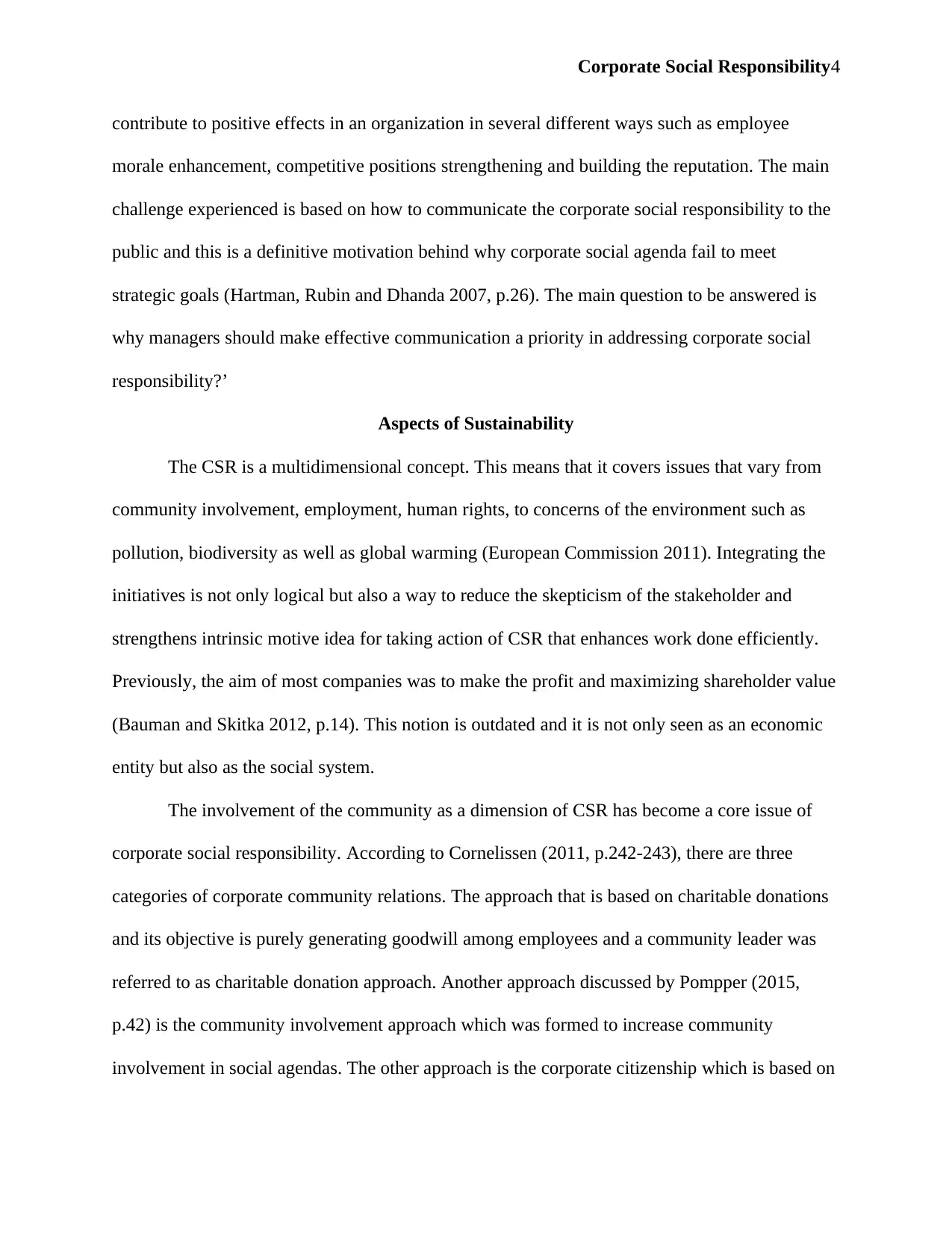
Corporate Social Responsibility4
contribute to positive effects in an organization in several different ways such as employee
morale enhancement, competitive positions strengthening and building the reputation. The main
challenge experienced is based on how to communicate the corporate social responsibility to the
public and this is a definitive motivation behind why corporate social agenda fail to meet
strategic goals (Hartman, Rubin and Dhanda 2007, p.26). The main question to be answered is
why managers should make effective communication a priority in addressing corporate social
responsibility?’
Aspects of Sustainability
The CSR is a multidimensional concept. This means that it covers issues that vary from
community involvement, employment, human rights, to concerns of the environment such as
pollution, biodiversity as well as global warming (European Commission 2011). Integrating the
initiatives is not only logical but also a way to reduce the skepticism of the stakeholder and
strengthens intrinsic motive idea for taking action of CSR that enhances work done efficiently.
Previously, the aim of most companies was to make the profit and maximizing shareholder value
(Bauman and Skitka 2012, p.14). This notion is outdated and it is not only seen as an economic
entity but also as the social system.
The involvement of the community as a dimension of CSR has become a core issue of
corporate social responsibility. According to Cornelissen (2011, p.242-243), there are three
categories of corporate community relations. The approach that is based on charitable donations
and its objective is purely generating goodwill among employees and a community leader was
referred to as charitable donation approach. Another approach discussed by Pompper (2015,
p.42) is the community involvement approach which was formed to increase community
involvement in social agendas. The other approach is the corporate citizenship which is based on
contribute to positive effects in an organization in several different ways such as employee
morale enhancement, competitive positions strengthening and building the reputation. The main
challenge experienced is based on how to communicate the corporate social responsibility to the
public and this is a definitive motivation behind why corporate social agenda fail to meet
strategic goals (Hartman, Rubin and Dhanda 2007, p.26). The main question to be answered is
why managers should make effective communication a priority in addressing corporate social
responsibility?’
Aspects of Sustainability
The CSR is a multidimensional concept. This means that it covers issues that vary from
community involvement, employment, human rights, to concerns of the environment such as
pollution, biodiversity as well as global warming (European Commission 2011). Integrating the
initiatives is not only logical but also a way to reduce the skepticism of the stakeholder and
strengthens intrinsic motive idea for taking action of CSR that enhances work done efficiently.
Previously, the aim of most companies was to make the profit and maximizing shareholder value
(Bauman and Skitka 2012, p.14). This notion is outdated and it is not only seen as an economic
entity but also as the social system.
The involvement of the community as a dimension of CSR has become a core issue of
corporate social responsibility. According to Cornelissen (2011, p.242-243), there are three
categories of corporate community relations. The approach that is based on charitable donations
and its objective is purely generating goodwill among employees and a community leader was
referred to as charitable donation approach. Another approach discussed by Pompper (2015,
p.42) is the community involvement approach which was formed to increase community
involvement in social agendas. The other approach is the corporate citizenship which is based on
Paraphrase This Document
Need a fresh take? Get an instant paraphrase of this document with our AI Paraphraser
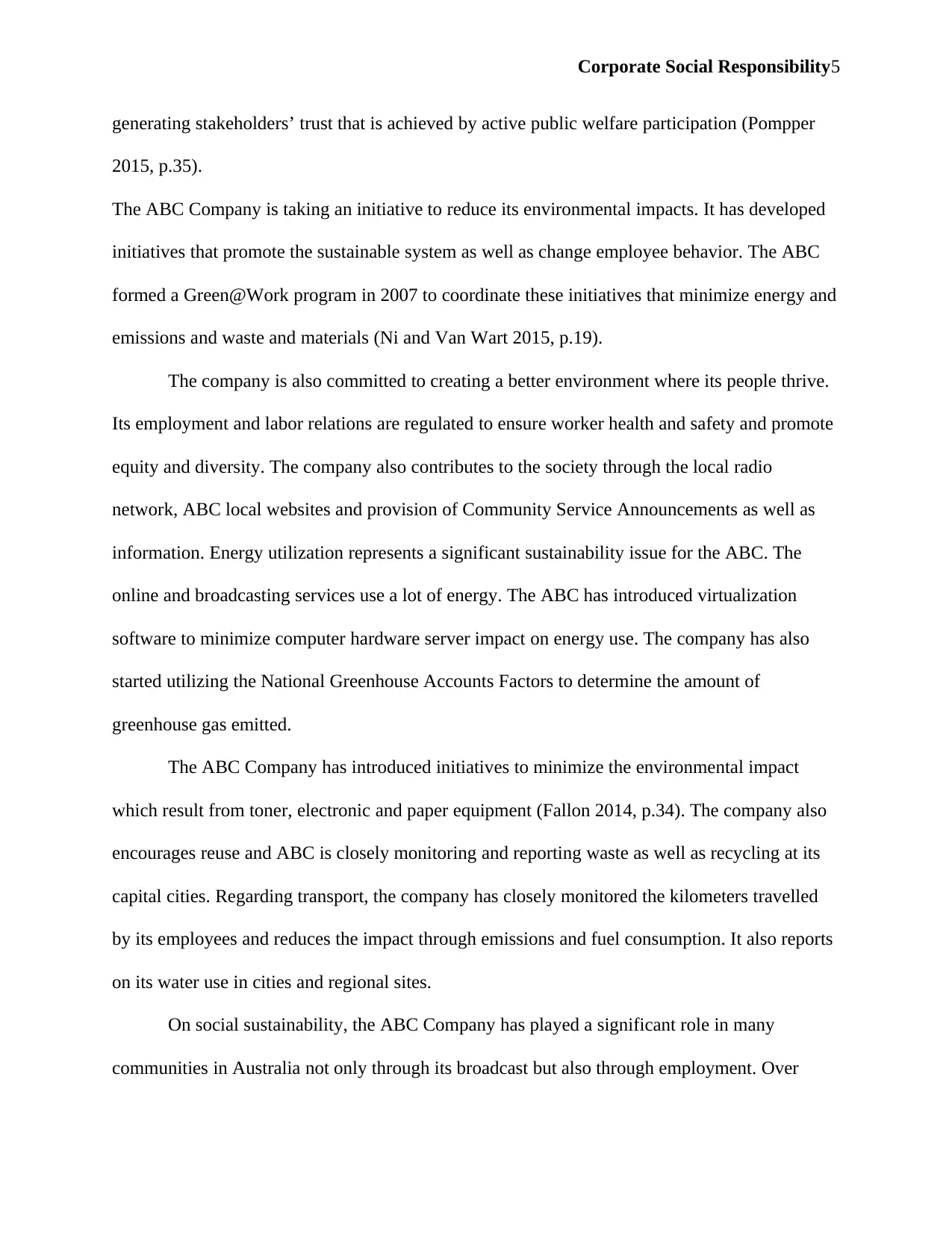
Corporate Social Responsibility5
generating stakeholders’ trust that is achieved by active public welfare participation (Pompper
2015, p.35).
The ABC Company is taking an initiative to reduce its environmental impacts. It has developed
initiatives that promote the sustainable system as well as change employee behavior. The ABC
formed a Green@Work program in 2007 to coordinate these initiatives that minimize energy and
emissions and waste and materials (Ni and Van Wart 2015, p.19).
The company is also committed to creating a better environment where its people thrive.
Its employment and labor relations are regulated to ensure worker health and safety and promote
equity and diversity. The company also contributes to the society through the local radio
network, ABC local websites and provision of Community Service Announcements as well as
information. Energy utilization represents a significant sustainability issue for the ABC. The
online and broadcasting services use a lot of energy. The ABC has introduced virtualization
software to minimize computer hardware server impact on energy use. The company has also
started utilizing the National Greenhouse Accounts Factors to determine the amount of
greenhouse gas emitted.
The ABC Company has introduced initiatives to minimize the environmental impact
which result from toner, electronic and paper equipment (Fallon 2014, p.34). The company also
encourages reuse and ABC is closely monitoring and reporting waste as well as recycling at its
capital cities. Regarding transport, the company has closely monitored the kilometers travelled
by its employees and reduces the impact through emissions and fuel consumption. It also reports
on its water use in cities and regional sites.
On social sustainability, the ABC Company has played a significant role in many
communities in Australia not only through its broadcast but also through employment. Over
generating stakeholders’ trust that is achieved by active public welfare participation (Pompper
2015, p.35).
The ABC Company is taking an initiative to reduce its environmental impacts. It has developed
initiatives that promote the sustainable system as well as change employee behavior. The ABC
formed a Green@Work program in 2007 to coordinate these initiatives that minimize energy and
emissions and waste and materials (Ni and Van Wart 2015, p.19).
The company is also committed to creating a better environment where its people thrive.
Its employment and labor relations are regulated to ensure worker health and safety and promote
equity and diversity. The company also contributes to the society through the local radio
network, ABC local websites and provision of Community Service Announcements as well as
information. Energy utilization represents a significant sustainability issue for the ABC. The
online and broadcasting services use a lot of energy. The ABC has introduced virtualization
software to minimize computer hardware server impact on energy use. The company has also
started utilizing the National Greenhouse Accounts Factors to determine the amount of
greenhouse gas emitted.
The ABC Company has introduced initiatives to minimize the environmental impact
which result from toner, electronic and paper equipment (Fallon 2014, p.34). The company also
encourages reuse and ABC is closely monitoring and reporting waste as well as recycling at its
capital cities. Regarding transport, the company has closely monitored the kilometers travelled
by its employees and reduces the impact through emissions and fuel consumption. It also reports
on its water use in cities and regional sites.
On social sustainability, the ABC Company has played a significant role in many
communities in Australia not only through its broadcast but also through employment. Over
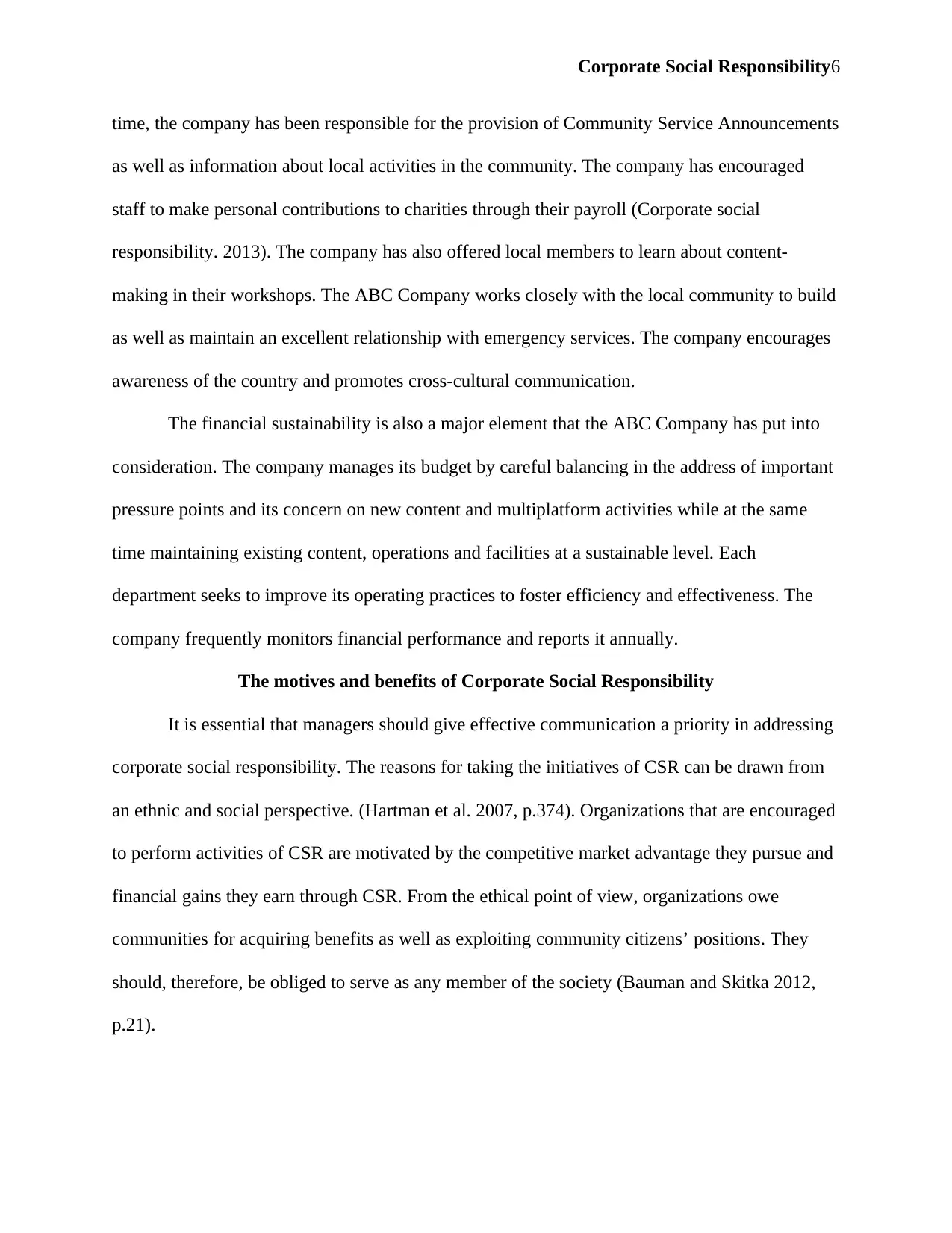
Corporate Social Responsibility6
time, the company has been responsible for the provision of Community Service Announcements
as well as information about local activities in the community. The company has encouraged
staff to make personal contributions to charities through their payroll (Corporate social
responsibility. 2013). The company has also offered local members to learn about content-
making in their workshops. The ABC Company works closely with the local community to build
as well as maintain an excellent relationship with emergency services. The company encourages
awareness of the country and promotes cross-cultural communication.
The financial sustainability is also a major element that the ABC Company has put into
consideration. The company manages its budget by careful balancing in the address of important
pressure points and its concern on new content and multiplatform activities while at the same
time maintaining existing content, operations and facilities at a sustainable level. Each
department seeks to improve its operating practices to foster efficiency and effectiveness. The
company frequently monitors financial performance and reports it annually.
The motives and benefits of Corporate Social Responsibility
It is essential that managers should give effective communication a priority in addressing
corporate social responsibility. The reasons for taking the initiatives of CSR can be drawn from
an ethnic and social perspective. (Hartman et al. 2007, p.374). Organizations that are encouraged
to perform activities of CSR are motivated by the competitive market advantage they pursue and
financial gains they earn through CSR. From the ethical point of view, organizations owe
communities for acquiring benefits as well as exploiting community citizens’ positions. They
should, therefore, be obliged to serve as any member of the society (Bauman and Skitka 2012,
p.21).
time, the company has been responsible for the provision of Community Service Announcements
as well as information about local activities in the community. The company has encouraged
staff to make personal contributions to charities through their payroll (Corporate social
responsibility. 2013). The company has also offered local members to learn about content-
making in their workshops. The ABC Company works closely with the local community to build
as well as maintain an excellent relationship with emergency services. The company encourages
awareness of the country and promotes cross-cultural communication.
The financial sustainability is also a major element that the ABC Company has put into
consideration. The company manages its budget by careful balancing in the address of important
pressure points and its concern on new content and multiplatform activities while at the same
time maintaining existing content, operations and facilities at a sustainable level. Each
department seeks to improve its operating practices to foster efficiency and effectiveness. The
company frequently monitors financial performance and reports it annually.
The motives and benefits of Corporate Social Responsibility
It is essential that managers should give effective communication a priority in addressing
corporate social responsibility. The reasons for taking the initiatives of CSR can be drawn from
an ethnic and social perspective. (Hartman et al. 2007, p.374). Organizations that are encouraged
to perform activities of CSR are motivated by the competitive market advantage they pursue and
financial gains they earn through CSR. From the ethical point of view, organizations owe
communities for acquiring benefits as well as exploiting community citizens’ positions. They
should, therefore, be obliged to serve as any member of the society (Bauman and Skitka 2012,
p.21).
⊘ This is a preview!⊘
Do you want full access?
Subscribe today to unlock all pages.

Trusted by 1+ million students worldwide
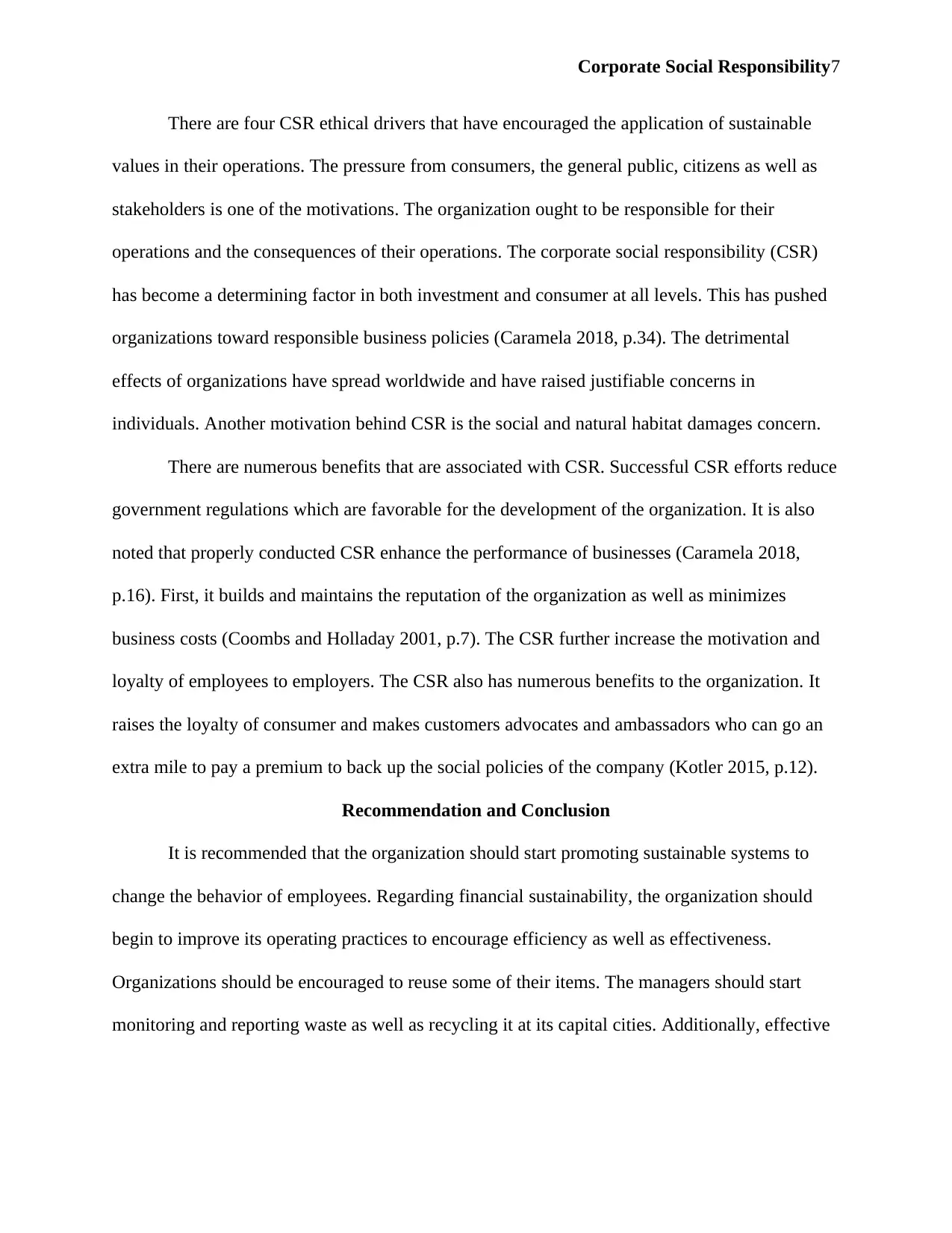
Corporate Social Responsibility7
There are four CSR ethical drivers that have encouraged the application of sustainable
values in their operations. The pressure from consumers, the general public, citizens as well as
stakeholders is one of the motivations. The organization ought to be responsible for their
operations and the consequences of their operations. The corporate social responsibility (CSR)
has become a determining factor in both investment and consumer at all levels. This has pushed
organizations toward responsible business policies (Caramela 2018, p.34). The detrimental
effects of organizations have spread worldwide and have raised justifiable concerns in
individuals. Another motivation behind CSR is the social and natural habitat damages concern.
There are numerous benefits that are associated with CSR. Successful CSR efforts reduce
government regulations which are favorable for the development of the organization. It is also
noted that properly conducted CSR enhance the performance of businesses (Caramela 2018,
p.16). First, it builds and maintains the reputation of the organization as well as minimizes
business costs (Coombs and Holladay 2001, p.7). The CSR further increase the motivation and
loyalty of employees to employers. The CSR also has numerous benefits to the organization. It
raises the loyalty of consumer and makes customers advocates and ambassadors who can go an
extra mile to pay a premium to back up the social policies of the company (Kotler 2015, p.12).
Recommendation and Conclusion
It is recommended that the organization should start promoting sustainable systems to
change the behavior of employees. Regarding financial sustainability, the organization should
begin to improve its operating practices to encourage efficiency as well as effectiveness.
Organizations should be encouraged to reuse some of their items. The managers should start
monitoring and reporting waste as well as recycling it at its capital cities. Additionally, effective
There are four CSR ethical drivers that have encouraged the application of sustainable
values in their operations. The pressure from consumers, the general public, citizens as well as
stakeholders is one of the motivations. The organization ought to be responsible for their
operations and the consequences of their operations. The corporate social responsibility (CSR)
has become a determining factor in both investment and consumer at all levels. This has pushed
organizations toward responsible business policies (Caramela 2018, p.34). The detrimental
effects of organizations have spread worldwide and have raised justifiable concerns in
individuals. Another motivation behind CSR is the social and natural habitat damages concern.
There are numerous benefits that are associated with CSR. Successful CSR efforts reduce
government regulations which are favorable for the development of the organization. It is also
noted that properly conducted CSR enhance the performance of businesses (Caramela 2018,
p.16). First, it builds and maintains the reputation of the organization as well as minimizes
business costs (Coombs and Holladay 2001, p.7). The CSR further increase the motivation and
loyalty of employees to employers. The CSR also has numerous benefits to the organization. It
raises the loyalty of consumer and makes customers advocates and ambassadors who can go an
extra mile to pay a premium to back up the social policies of the company (Kotler 2015, p.12).
Recommendation and Conclusion
It is recommended that the organization should start promoting sustainable systems to
change the behavior of employees. Regarding financial sustainability, the organization should
begin to improve its operating practices to encourage efficiency as well as effectiveness.
Organizations should be encouraged to reuse some of their items. The managers should start
monitoring and reporting waste as well as recycling it at its capital cities. Additionally, effective
Paraphrase This Document
Need a fresh take? Get an instant paraphrase of this document with our AI Paraphraser
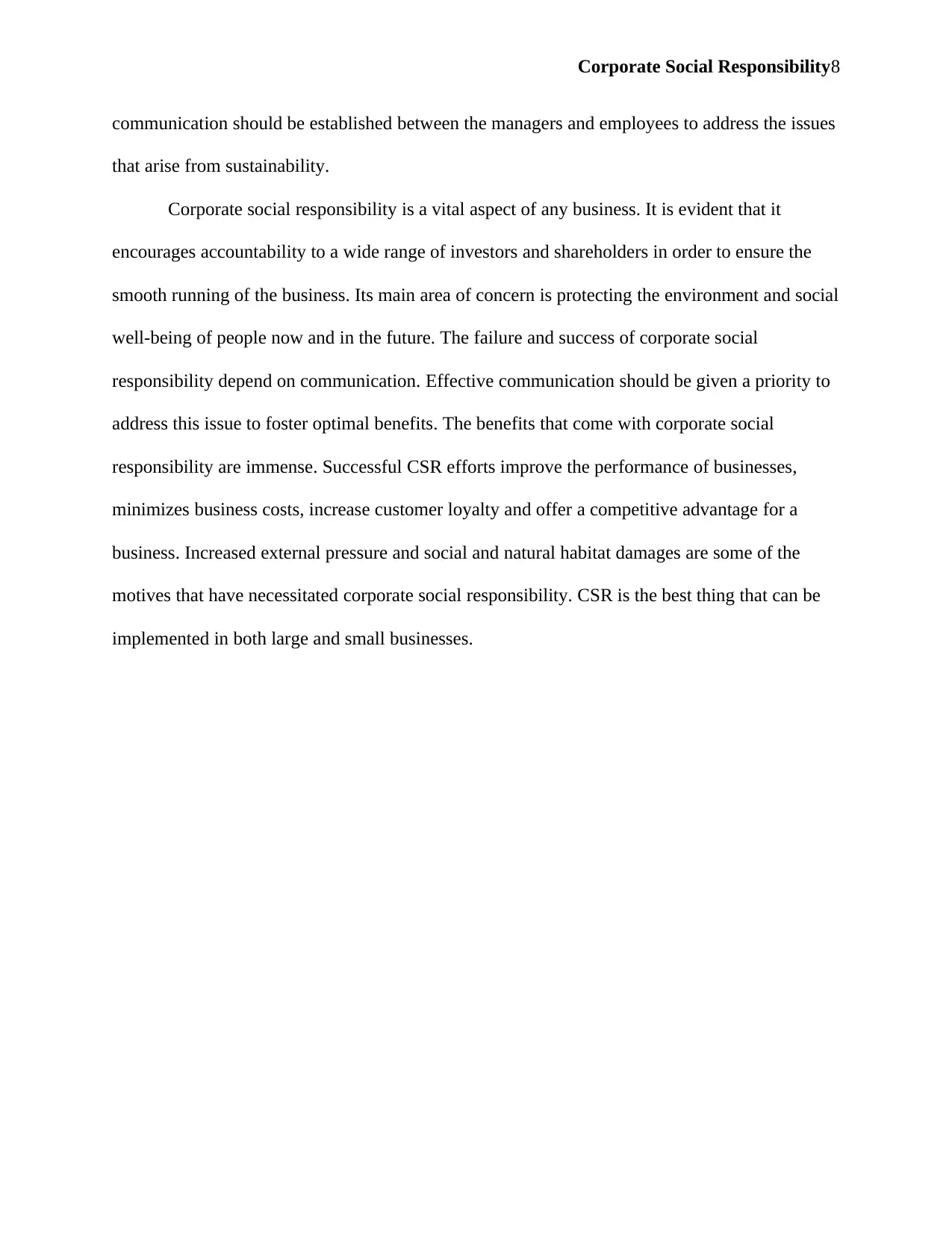
Corporate Social Responsibility8
communication should be established between the managers and employees to address the issues
that arise from sustainability.
Corporate social responsibility is a vital aspect of any business. It is evident that it
encourages accountability to a wide range of investors and shareholders in order to ensure the
smooth running of the business. Its main area of concern is protecting the environment and social
well-being of people now and in the future. The failure and success of corporate social
responsibility depend on communication. Effective communication should be given a priority to
address this issue to foster optimal benefits. The benefits that come with corporate social
responsibility are immense. Successful CSR efforts improve the performance of businesses,
minimizes business costs, increase customer loyalty and offer a competitive advantage for a
business. Increased external pressure and social and natural habitat damages are some of the
motives that have necessitated corporate social responsibility. CSR is the best thing that can be
implemented in both large and small businesses.
communication should be established between the managers and employees to address the issues
that arise from sustainability.
Corporate social responsibility is a vital aspect of any business. It is evident that it
encourages accountability to a wide range of investors and shareholders in order to ensure the
smooth running of the business. Its main area of concern is protecting the environment and social
well-being of people now and in the future. The failure and success of corporate social
responsibility depend on communication. Effective communication should be given a priority to
address this issue to foster optimal benefits. The benefits that come with corporate social
responsibility are immense. Successful CSR efforts improve the performance of businesses,
minimizes business costs, increase customer loyalty and offer a competitive advantage for a
business. Increased external pressure and social and natural habitat damages are some of the
motives that have necessitated corporate social responsibility. CSR is the best thing that can be
implemented in both large and small businesses.
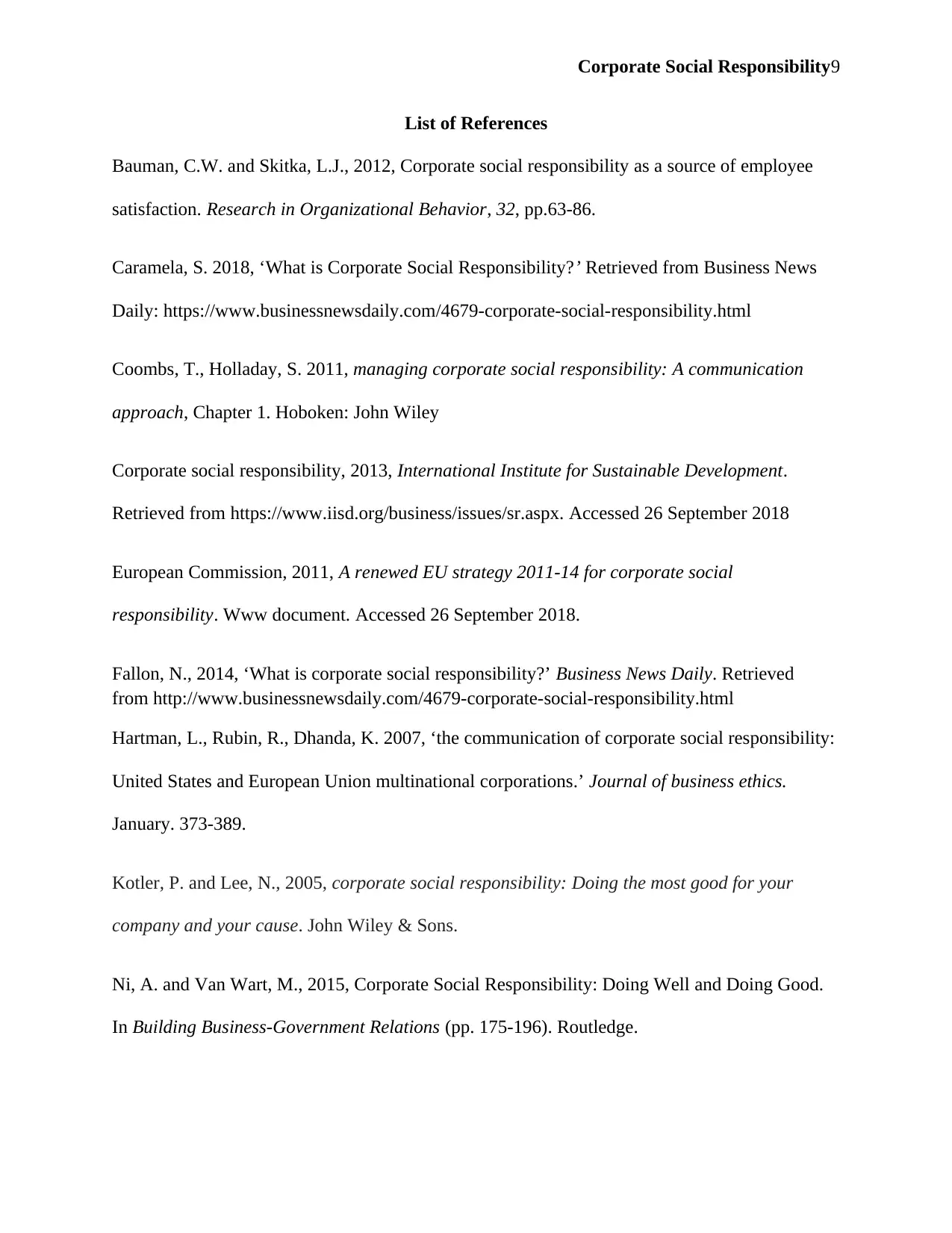
Corporate Social Responsibility9
List of References
Bauman, C.W. and Skitka, L.J., 2012, Corporate social responsibility as a source of employee
satisfaction. Research in Organizational Behavior, 32, pp.63-86.
Caramela, S. 2018, ‘What is Corporate Social Responsibility?’ Retrieved from Business News
Daily: https://www.businessnewsdaily.com/4679-corporate-social-responsibility.html
Coombs, T., Holladay, S. 2011, managing corporate social responsibility: A communication
approach, Chapter 1. Hoboken: John Wiley
Corporate social responsibility, 2013, International Institute for Sustainable Development.
Retrieved from https://www.iisd.org/business/issues/sr.aspx. Accessed 26 September 2018
European Commission, 2011, A renewed EU strategy 2011-14 for corporate social
responsibility. Www document. Accessed 26 September 2018.
Fallon, N., 2014, ‘What is corporate social responsibility?’ Business News Daily. Retrieved
from http://www.businessnewsdaily.com/4679-corporate-social-responsibility.html
Hartman, L., Rubin, R., Dhanda, K. 2007, ‘the communication of corporate social responsibility:
United States and European Union multinational corporations.’ Journal of business ethics.
January. 373-389.
Kotler, P. and Lee, N., 2005, corporate social responsibility: Doing the most good for your
company and your cause. John Wiley & Sons.
Ni, A. and Van Wart, M., 2015, Corporate Social Responsibility: Doing Well and Doing Good.
In Building Business-Government Relations (pp. 175-196). Routledge.
List of References
Bauman, C.W. and Skitka, L.J., 2012, Corporate social responsibility as a source of employee
satisfaction. Research in Organizational Behavior, 32, pp.63-86.
Caramela, S. 2018, ‘What is Corporate Social Responsibility?’ Retrieved from Business News
Daily: https://www.businessnewsdaily.com/4679-corporate-social-responsibility.html
Coombs, T., Holladay, S. 2011, managing corporate social responsibility: A communication
approach, Chapter 1. Hoboken: John Wiley
Corporate social responsibility, 2013, International Institute for Sustainable Development.
Retrieved from https://www.iisd.org/business/issues/sr.aspx. Accessed 26 September 2018
European Commission, 2011, A renewed EU strategy 2011-14 for corporate social
responsibility. Www document. Accessed 26 September 2018.
Fallon, N., 2014, ‘What is corporate social responsibility?’ Business News Daily. Retrieved
from http://www.businessnewsdaily.com/4679-corporate-social-responsibility.html
Hartman, L., Rubin, R., Dhanda, K. 2007, ‘the communication of corporate social responsibility:
United States and European Union multinational corporations.’ Journal of business ethics.
January. 373-389.
Kotler, P. and Lee, N., 2005, corporate social responsibility: Doing the most good for your
company and your cause. John Wiley & Sons.
Ni, A. and Van Wart, M., 2015, Corporate Social Responsibility: Doing Well and Doing Good.
In Building Business-Government Relations (pp. 175-196). Routledge.
⊘ This is a preview!⊘
Do you want full access?
Subscribe today to unlock all pages.

Trusted by 1+ million students worldwide

Corporate Social Responsibility10
Pompper, D 2015, corporate social responsibility, sustainability and public relations: Negotiating
multiple complex challenges. Routledge.
United Nations 2010, Sustainable development: From Brundtland to Rio 2012. Retrieved from
www document. Accessed 26 September 2018
Pompper, D 2015, corporate social responsibility, sustainability and public relations: Negotiating
multiple complex challenges. Routledge.
United Nations 2010, Sustainable development: From Brundtland to Rio 2012. Retrieved from
www document. Accessed 26 September 2018
1 out of 10
Related Documents
Your All-in-One AI-Powered Toolkit for Academic Success.
+13062052269
info@desklib.com
Available 24*7 on WhatsApp / Email
![[object Object]](/_next/static/media/star-bottom.7253800d.svg)
Unlock your academic potential
Copyright © 2020–2026 A2Z Services. All Rights Reserved. Developed and managed by ZUCOL.





